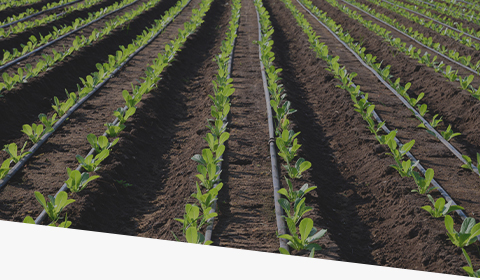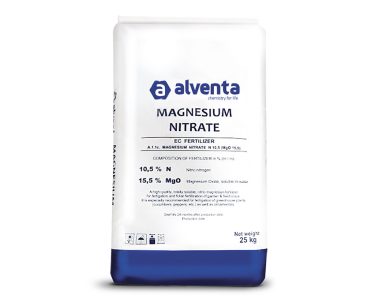- Magnesium nitrate has a higher nutritional value and better physical properties compared to the sulfate form, making it more convenient for handling and application
- 100% nutrient for the crops – magnesium is an essential nutrient in plant nutrition. It is a key component in the chlorophyll molecule – essential for photosynthesis and carbohydrate formation. Magnesium is involved in enzymatic reactions and helps generate energy. It is also important in the formation of seeds with high oil content. Magnesium deficiency retards plant development, resulting in reduced yield and poor quality
- Contains no chlorine, sodium or other impurities
- Dissolves quickly and completely in water
- Particularly suitable for fertigation and foliar spray applications
Magnesium nitrate (Mg(NO₃)₂.7H₂O)
Magnesium nitrate provides plants with readily available magnesium, which is essential for the normal plant development. The nitrate form of nitrogen facilitates the uptake of magnesium by the plant, thus improving its efficiency. It also enriches the plant’s diet with readily available, easily assimilable nitrogen.
• Fertigation
For carbonate soils, fertigation can be the most effective method for applying magnesium to the soil, directing it in a readily soluble form to the area where the roots actively feed, through drip and sprinkler irrigation systems. The recommended application rate for magnesium nitrate in fertigation programs is 25 – 30 kg/Ha per application. Three or more applications at intervals of two weeks are possible during active vegetation.
• Foliar application of magnesium supplements but does not completely replace soil application. Foliar nutrition is widely used in fruit and vegetable crops to correct magnesium deficiency.
– for field crops 2 – 5 kg/100 l; spraying solutions up to 100 l/Ha
– for vegetables 0,250 – 1 kg/100 l; spraying solutions up to 500 l/Ha
– fruit trees and vines 250-500 g/100 l; spraying solutions up to 1000 l/Ha
Magnesium nitrate is incompatible with phosphate, calcium, and boron-containing fertilizers due to the risk of forming insoluble precipitates.
- Magnesium nitrate has a higher nutritional value and better physical properties compared to the sulfate form, making it more convenient for handling and application
- 100% nutrient for the crops – magnesium is an essential nutrient in plant nutrition. It is a key component in the chlorophyll molecule – essential for photosynthesis and carbohydrate formation. Magnesium is involved in enzymatic reactions and helps generate energy. It is also important in the formation of seeds with high oil content. Magnesium deficiency retards plant development, resulting in reduced yield and poor quality
- Contains no chlorine, sodium or other impurities
- Dissolves quickly and completely in water
- Particularly suitable for fertigation and foliar spray applications
• Fertigation
For carbonate soils, fertigation can be the most effective method for applying magnesium to the soil, directing it in a readily soluble form to the area where the roots actively feed, through drip and sprinkler irrigation systems. The recommended application rate for magnesium nitrate in fertigation programs is 25 – 30 kg/Ha per application. Three or more applications at intervals of two weeks are possible during active vegetation.
• Foliar application of magnesium supplements but does not completely replace soil application. Foliar nutrition is widely used in fruit and vegetable crops to correct magnesium deficiency.
– for field crops 2 – 5 kg/100 l; spraying solutions up to 100 l/Ha
– for vegetables 0,250 – 1 kg/100 l; spraying solutions up to 500 l/Ha
– fruit trees and vines 250-500 g/100 l; spraying solutions up to 1000 l/Ha
Magnesium nitrate is incompatible with phosphate, calcium, and boron-containing fertilizers due to the risk of forming insoluble precipitates.




